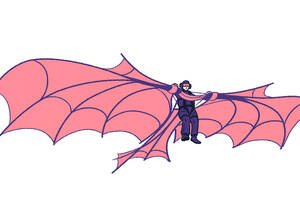Leadership Oct 31, 2011
Nice Guys Finish Last
Altruism may be rewarded with prestige, but seldom with leadership
Altruism is a key component of a functioning society, but it is constantly in danger of being exploited. Selfish people can easily live off the kindness of others and, in doing so, harm the group by siphoning valuable resources. Social scientists have long sought a reasonable explanation for why altruism exists. One widely accepted assumption is that groups recognize altruistic contributions by conferring status on the generous person, whether that be through higher social rank, recognition, or simply respect. Yet this theory is not perfect, as it fails to explain why leaders who behave selfishly make it into power.
Robert Livingston, an assistant professor of management and organizations at the Kellogg School of Management, and co-authors Nir Halevy, an acting assistant professor at Stanford University, Eileen Chou, a lecturer at the Kellogg School, and Taya Cohen, an assistant professor at Carnegie Mellon University, are the latest to weigh in on the debate about the role of altruistic behavior in human society and its origins. Altruism, they argue, may be beneficial or detrimental to a person’s social status, depending on how it is defined. It can also serve as a barrier on the path to leadership.
The original hypothesis—that altruism leads to higher status—is based on an overly broad definition of status. Status can be broken down into two component parts, dominance and prestige, Livingston and his colleagues argue. Both refer to a person’s rank and position within a group, and both can lead to social influence and power—but the similarities end there. “Dominance,” Livingston says, “involves the use of intimidation and coercion to attain a social status based largely on the effective induction of fear.” Prestige, on the other hand, is often based on altruistic achievements or having a sound character, or even “just being a great person,” he adds. More importantly, “prestige is freely conferred by others, not imposed on others.”
Livingston cites Al Capone and the Dalai Lama as two real-world examples that illustrate the two sides of status. Al Capone garnered respect, but only because people tended to wind up dead if they crossed him. The Dalai Lama is the opposite. Respected for his teachings on nonviolence and views on democracy and religious harmony, he receives “freely conferred admiration and deference,” Livingston points out.
Rating Dominance and Prestige
Curious about how altruism might affect the two sides of status, Livingston and his colleagues conducted three separate studies. Participants were divided into four-person groups and were given ten game chips worth a total of $20, which they could allocate however they chose, including keeping the chips to themselves. The different experiments varied the level of contribution as well as whether contributions helped an individual’s group, helped an individual’s group and a separate group, or helped the individual’s group but hurt the other group.
In each study, participants were asked to rate their fellow group members on dominance and prestige. In the second and third studies, they were also asked what type of person they would like to lead them in a within-group task or a competitive intergroup task.
In the first experiment, selfish participants—free-riders who kept all of the chips and contributed nothing to the group—were rated lower in prestige but higher in dominance than participants who contributed to the group. In subsequent studies, participants who harmed another group were also rated higher in dominance than people who contributed to their own group without harming outsiders. Finally, the most generous individuals—those who contributed to benefit both their group and outsiders—were rated lowest in both dominance and prestige. In sum, individuals were seen as more dominant if they were selfish and discriminated in favor of their own group at the expense of others.
“Altruism is a double-edged sword.” — Livingston
When it came time to select leaders, dominance and prestige played distinctly different roles, depending on the type of leadership that was required. In instances where there was no intergroup competition, people preferred individuals with more prestige. But when groups had to compete against each other, dominant individuals rose to the top while benevolent people were least likely to be elected.
Many—if not most—social contexts involve more than one group and are inherently competitive, Livingston notes. This may give selfish or dominant people an advantage in these circumstances and could be one source of corruption in governments and other organizations. “Prior theory and research has argued that power corrupts, but what our data suggest is that people may be favoring individuals with a higher propensity for corruption,” he says. “Leadership contexts are not invariably about competitive strategy. Leaders also balance budgets and make decisions that affect one’s own group alone. By definition, generous and benevolent people are more likely to behave fairly, and are less likely than selfish and dominant people to oppress and exploit others.”
A Double-edged Sword
“Do nice guys finish last?” Livingston ruminates. “In competitive contexts, the answer is often yes. The reason that they finish last is because being nice, contributing costly resources to the group, acts of generosity—these all increase your prestige. Other people admire you and say, ‘Oh, that’s really great. This is a kind person who’s doing all these wonderful things.’ But it decreases your dominance. It makes you look not so tough.”
“Altruism is a double-edged sword,” he says. “On the one hand, generous individuals are admired for their kindness, compassion, and willingness to help. On the other hand, they may be perceived as feeble ‘bleeding hearts’ who lack the guts to make tough decisions that might advance the goals of the organization.”
Taken at face value, the study’s results paint a pretty dim picture of our leaders. But things are not as bleak as they suggest. While dominance may be a defining trait of many leaders, people do pay attention to prestige as well. “Prestige and dominance are not mutually exclusive,” Livingston says.
“If you’re too soft—no matter how competent and able you are—people may not respect your authority. But if you only have dominance and you don’t have great ideas, and you use force to stay in power, then people will resent you,” he concludes. “Being successful as a leader requires one to have both dominance and prestige.”
Related reading on Kellogg Insight
The Teddy Bear Effect: Does a babyface benefit black CEOs?
Get Over Yourself: Why we think we’re forces to be reckoned with
Stacking the Deck Against Racism: A psychological explanation for impartiality
Halevy Nir, Eileen Y. Chou, Taya R. Cohen, Robert W. Livingston. 2012. Status conferral In intergroup social dilemmas: Behavioral antecedents and consequences of prestige and dominance, Journal of Personality and Social Psychology 102(2): 351-366. .


